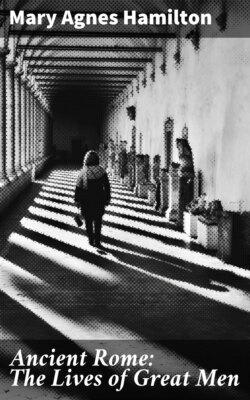Ancient Rome: The Lives of Great Men

Реклама. ООО «ЛитРес», ИНН: 7719571260.
Оглавление
Mary Agnes Hamilton. Ancient Rome: The Lives of Great Men
Ancient Rome: The Lives of Great Men
Table of Contents
LIST OF ILLUSTRATIONS
I. INTRODUCTORY. The People and City of Rome
II. The Early Heroes
Brutus and Tarquin
The Death of Lucretia
Mucius and Cloelia
Mucius: The Spirit of Rome
Cloelia’s Heroism
Regulus
The Honour of Regulus
Marcus Curtius
The Devotion of Marcus Curtius
Coriolanus
The Capture of Corioli
The Mother’s Appeal
A Happy Victory
CHAPTER III. The Great Enemies of Rome
Pyrrhus
Pyrrhus and Fabricius
Carthage
Hannibal
Hannibal’s March: the Sight of the Promised Land
Flaminius before Trasimene
After Trasimene
The Strategy of Fabius
Metaurus, and After
Despair
IV. The Scipios
Africanus, the Young Proconsul
Scipio Aemilianus
Scipio Aemilianus as a Sportsman
V. The Gracchi
Tiberius Gracchus. The Value of a Reputation for Integrity
Caius Gracchus. The varied Activities of a popular Leader
VI. Cato the Censor
The Duties of a Bailiff and his Wife
VII. Caius Marius and Lucius Cornelius Sulla
Drusus
Sulla Felix
VIII. The New Rome
IX. Lucius Licinius Lucullus
After Strenuous Years
X. Cnaeus Pompeius
Pompeius in his Prime
The Last Phase: the ‘Shadow of a Mighty Name’
A Broken Idol
XI. Marcus Licinius Crassus
Carrhae
XII. Marcus Tullius Cicero
Cicero’s Day of Triumph
The Return
XIII. Caius Julius Caesar
How Caesar dealt with threats of insubordination provoked by fear of meeting the Germans
The Approach to the Rubicon: a Poet’s Phantasy
The Penalty of Greatness
Отрывок из книги
Mary Agnes Hamilton
Published by Good Press, 2021
.....
Caius Marcius belonged to one of the oldest and proudest families in the Republic. A member of this family had been one of the Seven Kings. His father died when Caius was but a boy and he was left in the charge of his mother Volumnia. Volumnia was a woman of noble character and fine mind. Her house was admirably ordered: everything in it was beautiful and yet simple. She brought up her son well: he excelled in all manly exercises, was of a courage that nothing could shake, scorned idleness, luxury, and wealth: believed that the one life for a Roman was a life of service to the death. But Volumnia did not succeed, as a father might have done, in curbing the faults of the lad’s character. Caius grew up headstrong, obstinate, and excessively proud. Personally highly gifted in mind and body, he was disposed to look down upon others less firm and resolute. He set, for himself, a high standard of uprightness and courage, and cared nothing for what other people thought of him. Among the youths with whom he grew up he was the natural leader: his will brooked no contradiction. Few dared to criticize or oppose him. Those less firm in mind, less brave in action, less indifferent to the opinion of others, he despised. Any one who failed in courage, endurance, or devotion he condemned without sympathy.
When but a lad he won, for bravery in battle, the crown of oak leaves given to soldiers who saved the life of a comrade in action. In all the fighting of the hard years in which Rome was defending itself against the other Italian peoples, Marcius was ever to the fore. He shrank from no fatigue, no danger: he was always in the hottest of the fight: first as a simple soldier, then as a general. In the field his soldiers adored him because he shared all their hardships and always led them to victory. Always, too, he refused to take any reward in money or riches. But when these same soldiers got back to Rome Coriolanus had no sympathy with them. Fighting was life to him: he did not see why it should not satisfy every one or understand the hardships of the common man whose wife and children were left behind in wretched poverty. There were indeed many things Coriolanus did not see. His harsh mind condemned without understanding the complaints of the poor. To him it seemed that they thought of themselves, instead of thinking about Rome. He did not realize that their hard lot compelled them to do so. His wealth and birth made him free, but they were not free.
.....